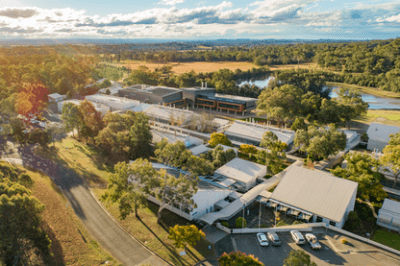THE NEW South Wales Government has committed more than $60 million to upgrade seven primary industry research facilities and five emergency response sites across the state.
Research facility upgrades will support the 1600 staff undertaking research across the state in vital areas such as, animal nutrition, climate change, aquaculture breeding as well as biosecurity surveillance and responses.
Emergency response sites are regularly utilised as operation centres during times of emergency, including floods, bushfires and biosecurity outbreaks.

The Elizabeth Macarthur Agricultural Institute at Menangle. Photo: NSW Government
Tamworth Agricultural Institute in north-west NSW, Elizabeth Macarthur Agricultural Institute at Menangle and Glen Innes Agricultural Research & Advisory station will receive upgrades to glasshouses which support climate impact research in crop and pasture species.
Solar batteries will be installed at Tamworth, Orange and Narrandera, supporting the NSW Government’s work towards Net Zero, and reducing the centres operating costs.
Elizabeth Macarthur Agricultural Institute in outer south-west Sydney and Orange Agricultural Institute on the Central Tablelands will receive funding to expand their insect storage and diagnostic testing facilities to enable rapid detection of pests that impact domestically traded and exported products.
Negative-air pressure systems will be installed at the EMAI to enable research and analysis of highly virulent pathogens that pose a risk to agricultural trade of livestock including beef, pork and lamb.
Tocal Agricultural Institute, in the Hunter Valley, will benefit from a state-of-the-art dairy facility that enables the highest animal welfare standard through an efficient and modern system using robotics.
Port Stephens Fisheries Institute will receive upgrades to enhance breeding facilities for oysters and finfish which allows research to support innovation in commercial fisheries.
Wagga Wagga Agricultural Institute’s small and large animal houses will be upgraded to increase their studies of animal nutrition and methane emissions research of sheep and cattle.
NSW Premier Chris Minns said upgrades to these centres will improve the states capacity during these times of crisis.
“One of the best investments we can make as a government is into the vital research which ensures this resilience can continue,” Mr Minns said.
“It’s often unsung work, but the research being done in these centres is what allows New South Wales to have a thriving agricultural sector, without which our state cannot succeed.”
NSW Farmers supportive
State farming body NSW Farmers has welcomed the funding announcement.
NSW Farmers president Xavier Martin said the package would drive gains in farm productivity and resiliency.
“We know farm businesses are exposed to a high level of risk and variability, and research and development is a key way we can build resilience, adapt to change and sustainably manage the land into the future,” Mr Martin said.
“As the population grows around the world, we need to grow more food, so investments that improve farm productivity in a practical way are very welcome.
“The possibilities are endless when it comes to agriculture, and with the support of governments to drive innovation, farmers can not only keep farming, but farm better than they ever have before.”
Research review
The NSW Government has also initiated a renewal of the state’s Primary Industries Research Strategy to ensure it reflects the needs and priorities of regional NSW.
The existing strategy has not been updated in more than 10 years.
In that time, regional communities have endured drought, floods and bushfires, with climate change projected to have an increasing impact on the states primary industries.
Former NSW chief scientist and engineer Professor Mary O’Kane will chair a panel of independent experts tasked with developing a renewed strategy which ensures NSW continues to deliver world-class research now and into the future.
- Other panel members will include:
- Daryl Quinlivan, former secretary of the Commonwealth Department of Agriculture;
- James Findlay, former chief executive officer of the Australian Fisheries Management Authority; and,
- Nick Austin, president of Australia’s Policy Advisory Council for International Agricultural Research.
The panel will consult with stakeholders, experts and the community, with a particular focus on developing a strategy which ensures research undertaken:
- Reflects industry, community and government priorities, including climate change, food security and cost of living;
- Promotes economic growth and community development in the regions; and,
- Improves outcomes for industry, the environment and the community.
An initial report to NSW Government on the panel’s work is expected by the end of 2024.
Source: NSW Government, NSW Farmers

HAVE YOUR SAY